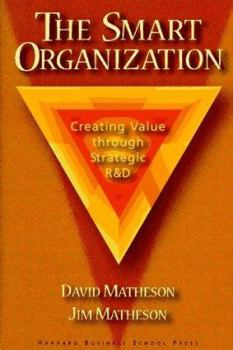The Smart Organization
Select Format
Select Condition 
Book Overview
This text aims to help managers improve their research and development management and decision-making. It discusses best practices, as well as nine principles of smart R&D, and includes a section on... This description may be from another edition of this product.
Format:Hardcover
Language:English
ISBN:087584765X
ISBN13:9780875847658
Release Date:October 1997
Publisher:Harvard Business Review Press
Length:292 Pages
Weight:1.43 lbs.
Dimensions:1.1" x 6.4" x 9.5"
Customer Reviews
5 ratings
Great book with real life application
Published by Thriftbooks.com User , 19 years ago
I bought this book with not much idea of what it has got for me. As a went through some of the initial chapters I really got interested.The book has numerous examples and case studies. This really helps in understanding the concept and driving an analogy to actual life scenarios. I strongly recommend reading this book. Thanks.
Great insights for all concerned with strategy and renewal.
Published by Thriftbooks.com User , 25 years ago
Focusing on large R & D intensive organizations, this book explores nine key principles that make these enterprises effective, such as: open information flow, systems thinking, and continual learning. The author's emphasize the decision making process as a means of changing and improving overall organizational performance. If you are seeking new insights into how strategy is developed, excellence can be achieved in decision making, and organization renewal can be realized, you will find this book enlightening and fascinating reading. The insights offered here are by no means limited to high-technology firms; they apply to any organization seeking to be successful in today's fast-paced markets. This work includes an organizational IQ test (a diagnostic tool) for identifying root causes of the barriers to improving decision processes. There is an impressive amount of knowledge about organization to be gleaned in The Smart Company. Whether you are a technology -based bus! iness or not, you will find many nuggets in this work. We highly recommend it.
One of the best organising frameworks I've met
Published by Thriftbooks.com User , 26 years ago
The Strategic Decisions Group framework for smart organisation is informative. One reason for this is that the authors are reporting a practical benchmark study of R & D which appears to include every American corporate I've ever heard of. They do readers the great favour of synthesising this into a 9 principle framework for Smart Organisation. 3 principles for achieving purpose: -continual learning -value creation culture -creating alternatives 3 principles for mobilizing resources: -open inforamtion flow -disciplined decision making -alignment and empowerment 3 principles for understaning environment: -systems thinking -embracing uncertainty -outside-in strategic perspective What I especially like is that for each principle 5 How do you knows? are given scaling the difference between an organisation which hasn't got a clue about the principle (not smart) to one that lives it (smart org) For example these are the 5 how-you-knows of alignment & empowerment: 1 Examine the strategies at different levels (eg technology strategy to portfolio strategy to project startegy). In smart org: there are clear strategies at all levels taht provide useful guidance for decision making. Strategies at one level are clearly linked to the next. Lower level strategies interpret and carry out the implementation of higher-level strategies. In not-smart: few strategies or they provide little guidance for decision-making. They are viewed cynically as corporate PR. Links among strategies are absent, unclear or ambiguous 2 Examine the value measures used to evaluate decisions at different levels. In smart org: there are clear measures of value at all levels. Value measures at one strategic level are clearly linked through the strategy to measures at the next level. In non-smart: There may be no value measures. If there are, each level sets its own values or decision criteria, with no special requirement that they be related to values and strategies at other levels. 3 Examine the approvals required to make or carry out important decisions. In smart org: Decisions require few approvals because people understand the strategy and are trusted to carry it out. Meetings with upper management are viewed as adding value. In not-smart: Decisions require many levels of approval. Review meetings are perceived as wasting time. Often meetings with upper management are feared because it may redirect efforts and change priorities without clear reason. Upper management often feels overloaded with the need to check on subordinates. 4 Examine the roles of people involved in an important recent decision. In smart orgs: Many people participated in the decision process,at multiple levels in the organisation. A dialogue was carried out in the process that continually aligned and refined the vertical links. Management at different levels collaborated to build a high quality decision and achieved aligned commitment to action. In non-smart: Either few people participated in the decision
This book is an invaluable resource.
Published by Thriftbooks.com User , 26 years ago
Quoted from Electronic Business, December 1997: "This book is an invaluable resource for any manager whose responsibilities extend to strategic planning." Bruce Rayner.
At long last (we have) found a potential path to salvation..
Published by Thriftbooks.com User , 26 years ago
Quoted from an e-mail from a major aerospace corporation executive: "Some of us at (large aerospace company) have at long last found a potential path to salvation in the Mathesons' new book, 'The Smart Organization.' (Director, Technology)




